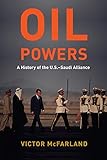Oil Powers : A History of the U.S.-Saudi Alliance / Victor McFarland.
Material type: TextPublisher: New York, NY : Columbia University Press, [2020]Copyright date: ©2020Description: 1 online resource : 5 b&w figuresContent type:
TextPublisher: New York, NY : Columbia University Press, [2020]Copyright date: ©2020Description: 1 online resource : 5 b&w figuresContent type: - 9780231552073
- 327.730538 23
- online - DeGruyter
| Item type | Current library | Call number | URL | Status | Notes | Barcode | |
|---|---|---|---|---|---|---|---|
 eBook
eBook
|
Biblioteca "Angelicum" Pont. Univ. S.Tommaso d'Aquino Nuvola online | online - DeGruyter (Browse shelf(Opens below)) | Online access | Not for loan (Accesso limitato) | Accesso per gli utenti autorizzati / Access for authorized users | (dgr)9780231552073 |
Browsing Biblioteca "Angelicum" Pont. Univ. S.Tommaso d'Aquino shelves, Shelving location: Nuvola online Close shelf browser (Hides shelf browser)

|

|

|

|

|

|

|
||
| online - DeGruyter Take Back What the Devil Stole : An African American Prophet's Encounters in the Spirit World / | online - DeGruyter Wisdom as a Way of Life : Theravāda Buddhism Reimagined / | online - DeGruyter Pleasure in Profit : Popular Prose in Seventeenth-Century Japan / | online - DeGruyter Oil Powers : A History of the U.S.-Saudi Alliance / | online - DeGruyter American Zealots : Inside Right-Wing Domestic Terrorism / | online - DeGruyter Sachiko : A Novel / | online - DeGruyter The Joys of Compounding : The Passionate Pursuit of Lifelong Learning, Revised and Updated / |
Frontmatter -- CONTENTS -- ACKNOWLEDGMENTS -- A NOTE ON ARABIC TRANSLITERATION -- Introduction: Jeddah, 1974 -- 1. Wheels of Empire -- 2. Roads to Profit -- 3. Ignition -- 4. Machines in Motion -- 5. The Cutoff -- 6. Unmoored -- 7. Turning Right -- 8. Ascent -- Conclusion -- Notes -- Bibliography -- Index
restricted access online access with authorization star
http://purl.org/coar/access_right/c_16ec
Since the mid-twentieth century, the United States and Saudi Arabia have built a close but often troubled alliance. In this critical history, Victor McFarland reveals the deep ties binding the leaders of the two nations. Connecting foreign relations and domestic politics, McFarland challenges the view that the U.S.-Saudi alliance is the inevitable consequence of American energy demand and Saudi Arabia’s huge oil reserves. Oil Powers traces the growth of the alliance through a dense web of political, economic, and social connections that bolstered royal and executive power and the national-security state. McFarland shows how U.S. and Saudi elites collaborated to advance their shared interests against rivals at home and abroad. During the 1970s, as higher oil prices enriched the Saudi government, destabilized the American economy, and changed the balance of power in the Middle East, leaders of both countries responded by consolidating their alliance. Facing objections from their own people, Washington and Riyadh chose to shield their partnership from public oversight and accountability. While American support empowered the Saudi royal family and helped the kingdom expand its influence across the Middle East, Saudi elites also encouraged a rightward shift in U.S. foreign and economic policy—with profound long-term effects. Oil Powers reveals the role of the U.S.-Saudi alliance in laying the groundwork for American military involvement in the Middle East and the entrenchment of a global order fueled by oil.
Mode of access: Internet via World Wide Web.
In English.
Description based on online resource; title from PDF title page (publisher's Web site, viewed 27. Jan 2023)


